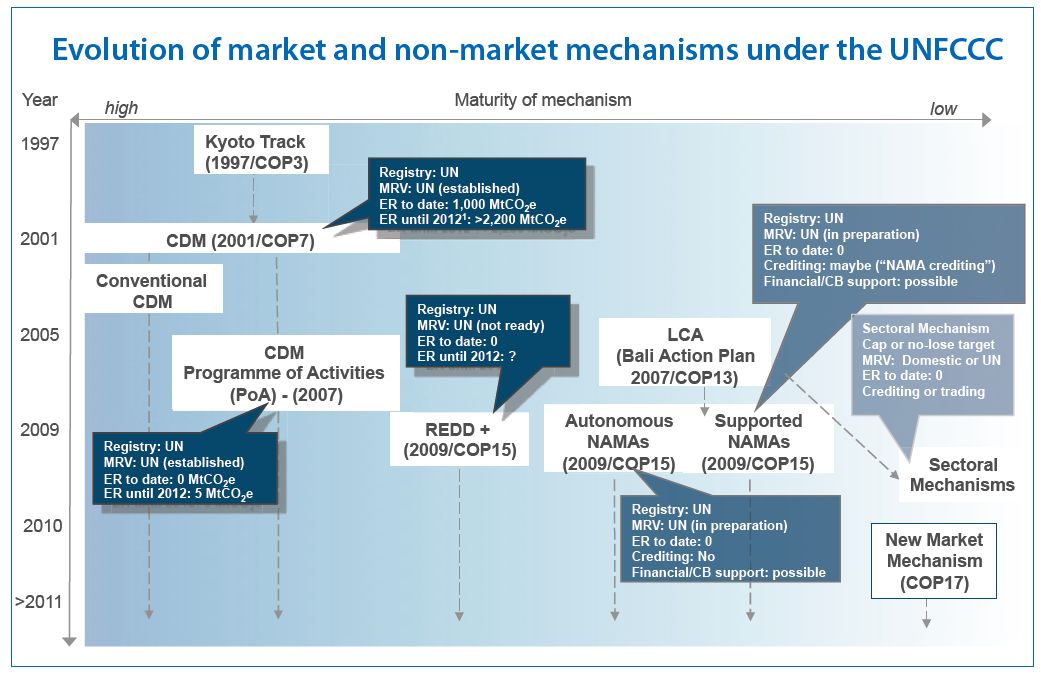Market-based Mechanisms in a Post-2012 Climate Change Regime
- Publication
- Citation
Paula Castro, Matthias Duwe, Michel Köhler, Elizabeth Zelljadt 2012: Market-based mechanisms in a post 2012 climate change regime. Ecologic Institute, University of Zurich - Institute of Political Science and Center for Comparative and International Studies (CIS), Perspectives GmbH, Berlin.
In the international negotiations under the United Nations Framework Convention on Climate Change (UNFCCC), Parties are discussing new market mechanisms that expand the concept of crediting emission reduction efforts with tradable units beyond the existing Clean Development Mechanism (CDM) to include a broader group of mitigation opportunities that could involve entire economic sectors of advanced developing countries. This paper explores the potential transition to such a new market-based mechanism. It looks at diplomatic hurdles, design issues, implementation questions, and concerns about the ensuing market for emission reduction units. It also explores, via empirical analysis, which countries and sectors are best suited for new market-based mechanisms. Since such a transition takes time, the last section of the paper evaluates potential interim solutions under which a market-based approach is still available to Parties while a new mechanism is being developed and implemented. The paper is available for download.
The report summarizes a larger analysis commissioned by the German Federal Environment Agency (UBA) and looks at the parties' official positions on new market mechanisms under the UNFCCC. It distinguishes between two possible scenarios for the implementation of new market mechanisms: a "centralized" future in which parties pursue a treaty-like approach with top-down governance and global institutions, and a "fragmented" future in which various countries/regions pursue different market-based approaches that may or may not be compatible.
The empirical analysis evaluates which countries and which sectors are best suited for a transition to new market mechanisms. Those with high political willingness for market-based solutions include several Latin American, Small Island and European countries. In terms of sectors, power generation and cement production as well as buildings have the highest abatement potential - power, steel and aluminum have the most suitable sector structure.
There are interim solutions that can continue market-based mitigation incentives while the transition to new market mechanisms is occurring: the CDM programmes of activities (PoAs), standardized baselines for CDM, and CDM discounting. We find that PoAs are most suitable as an interim solution in both a “centralized” and “fragmented” future for new market mechanism implementation, as they retain the CDM’s structure and thus the trust of existing market players, while encouraging expansion of mitigation activities beyond the project level to the sector level.
The research also highlights the critical role of demand for emission limitation or reduction credits as a driver for the development of flexible mechanisms. In the absence of tighter targets, the low demand and resulting low carbon price leaves few incentives for the development of new mechanisms.
Looking forward, we conclude that the climate regime may evolve in such a way that elements of the scenarios used in the analysis occur in sequence, with a more fragmented world potentially developing into a more centralized set of rules over the next 3-8 years. Given such a context, Germany and the EU should seek to facilitate a transition to new market mechanisms in ways that can work in both a centralized and fragmented future, including
- engaging in bi- and multilateral cooperation to support the establishment of new market mechanisms, particularly with the countries this report’s empirical analysis has concluded to be good candidates for such cooperation
- facilitating creation of the institutional infrastructure necessary for participation in new market mechanisms
- offering financial and material support for data gathering and emissions assessment at the sector level
- creating venues for the exchange of technical expertise around e.g. data gathering and analysis
The Summary Report is available for free. The larger analysis it summarizes will be published by the UBA.
